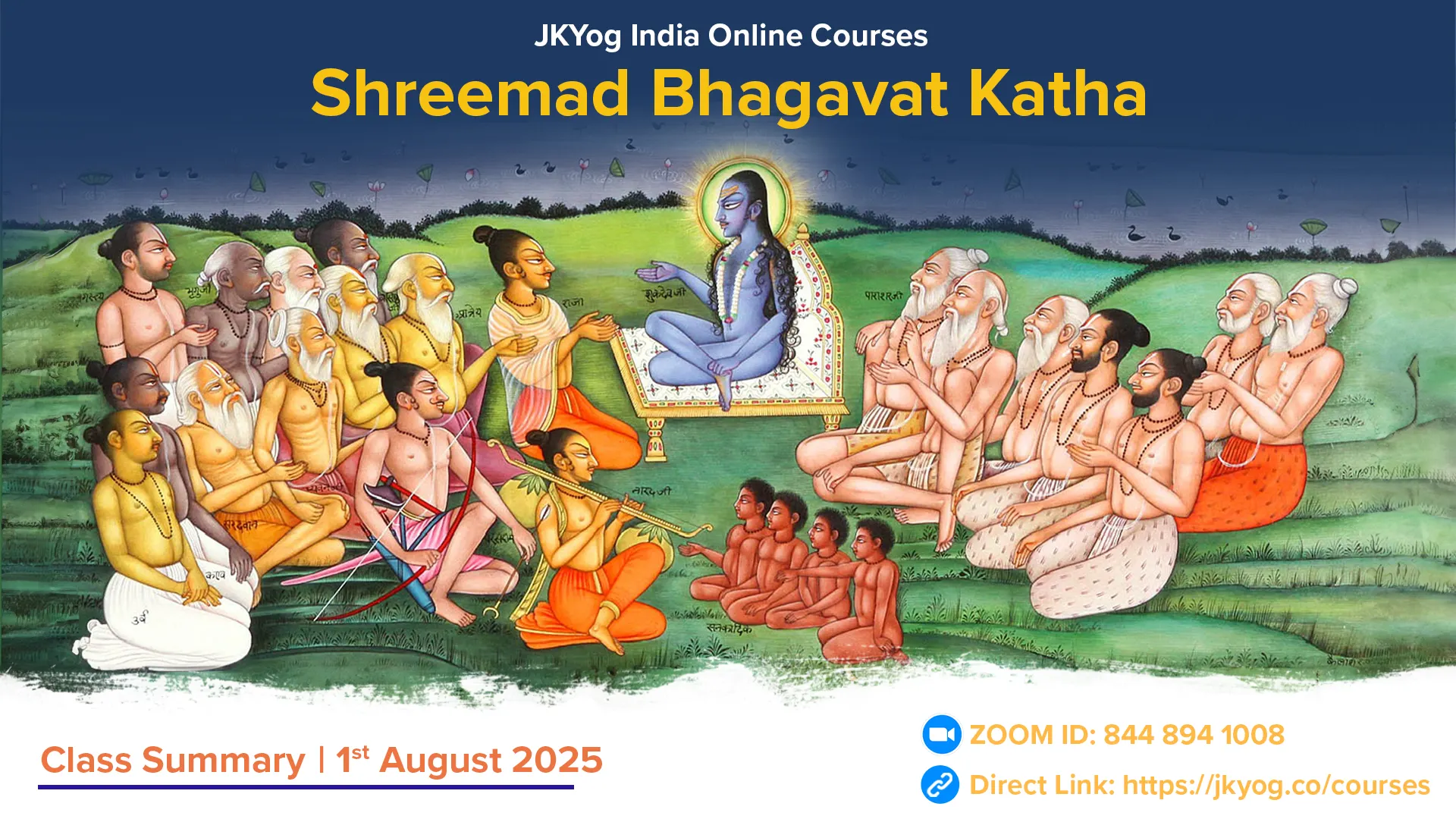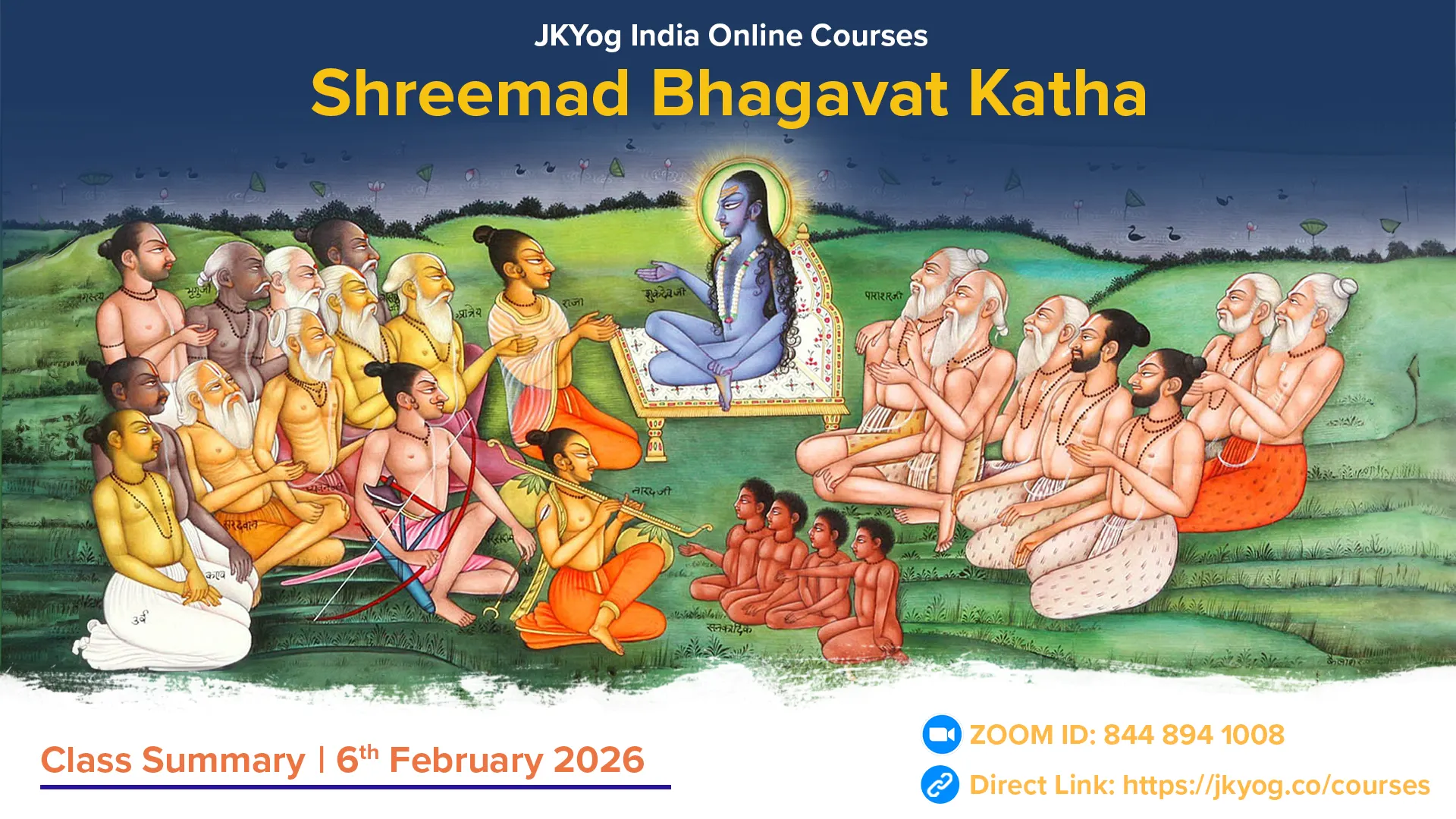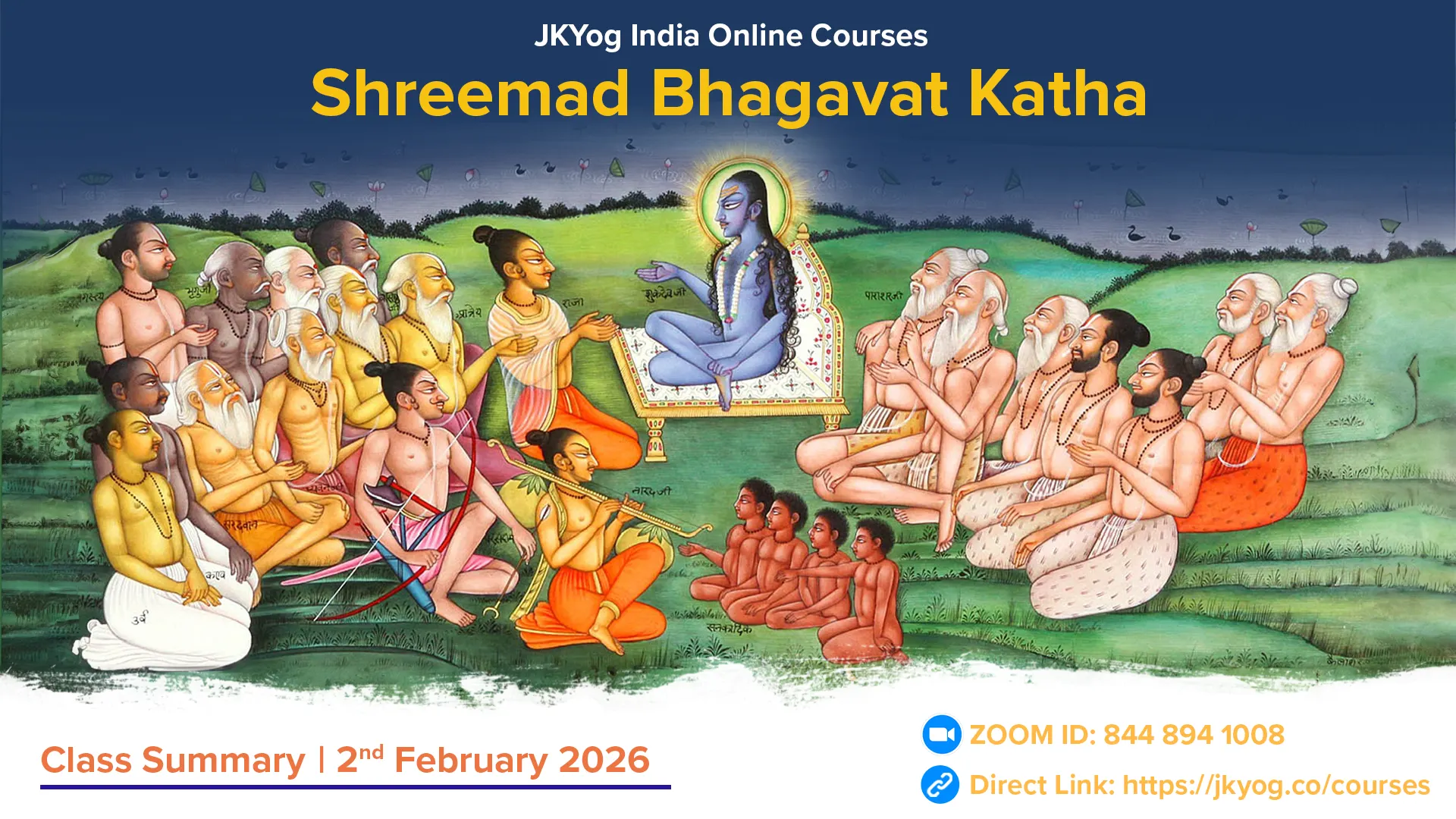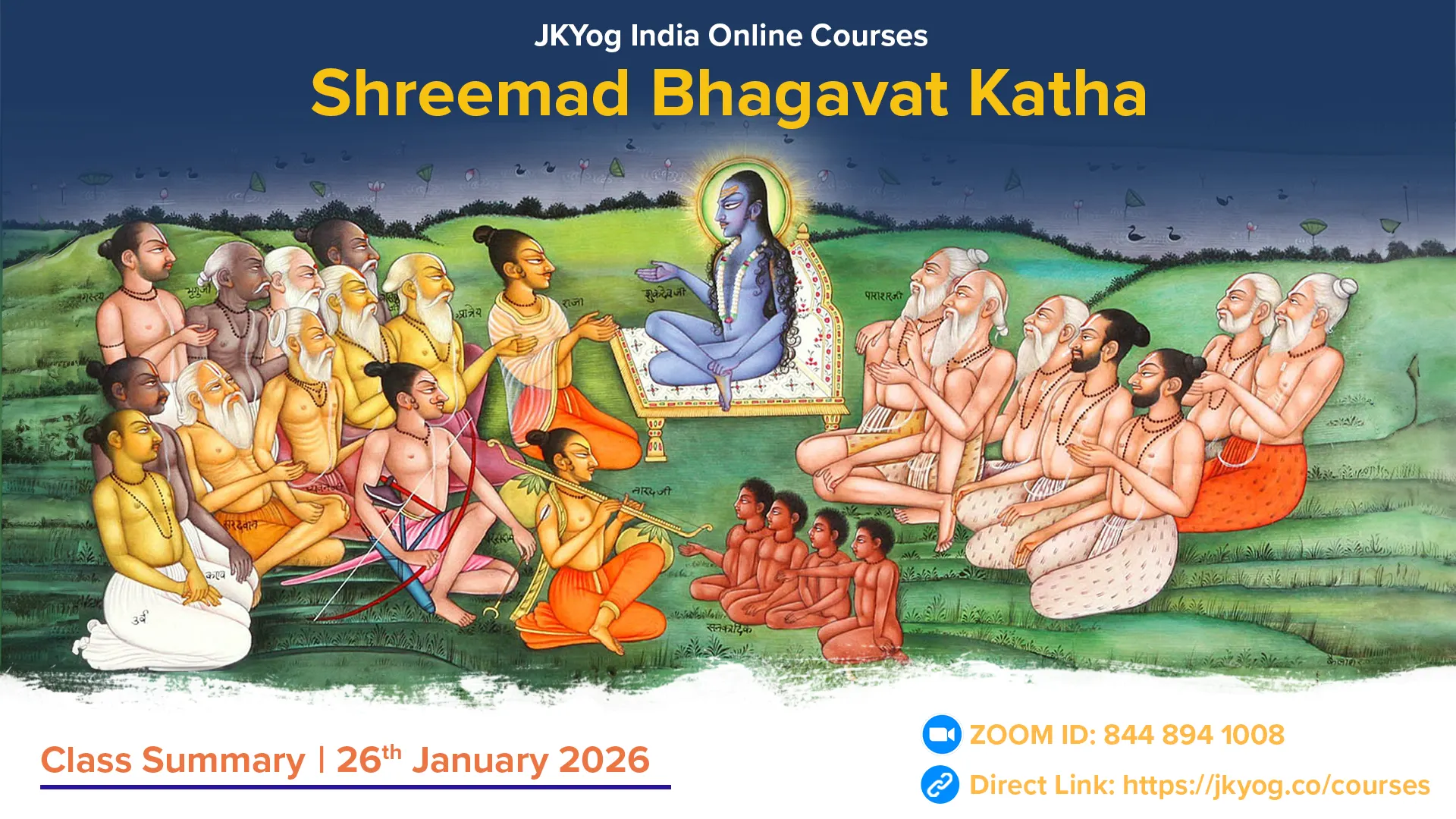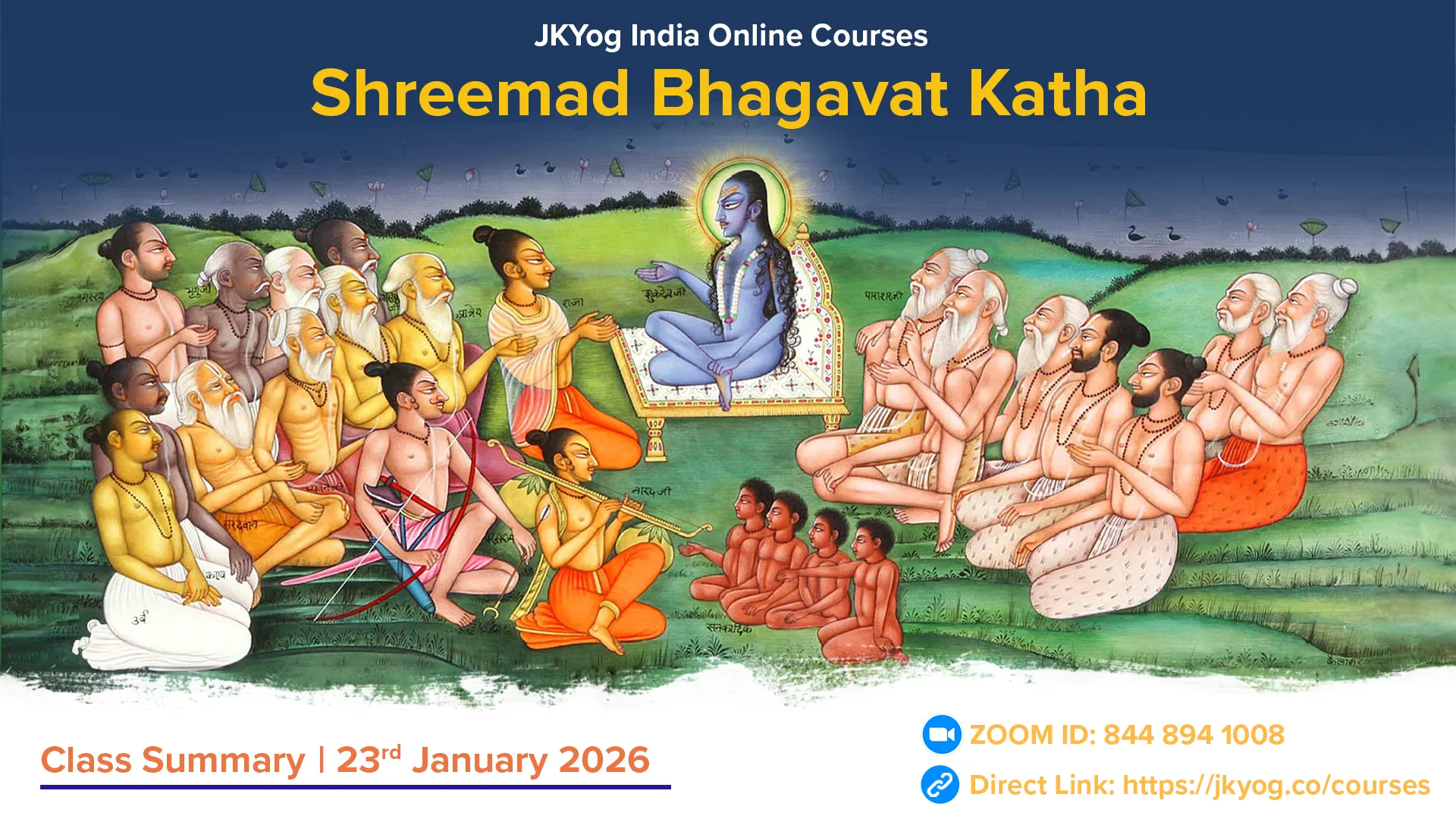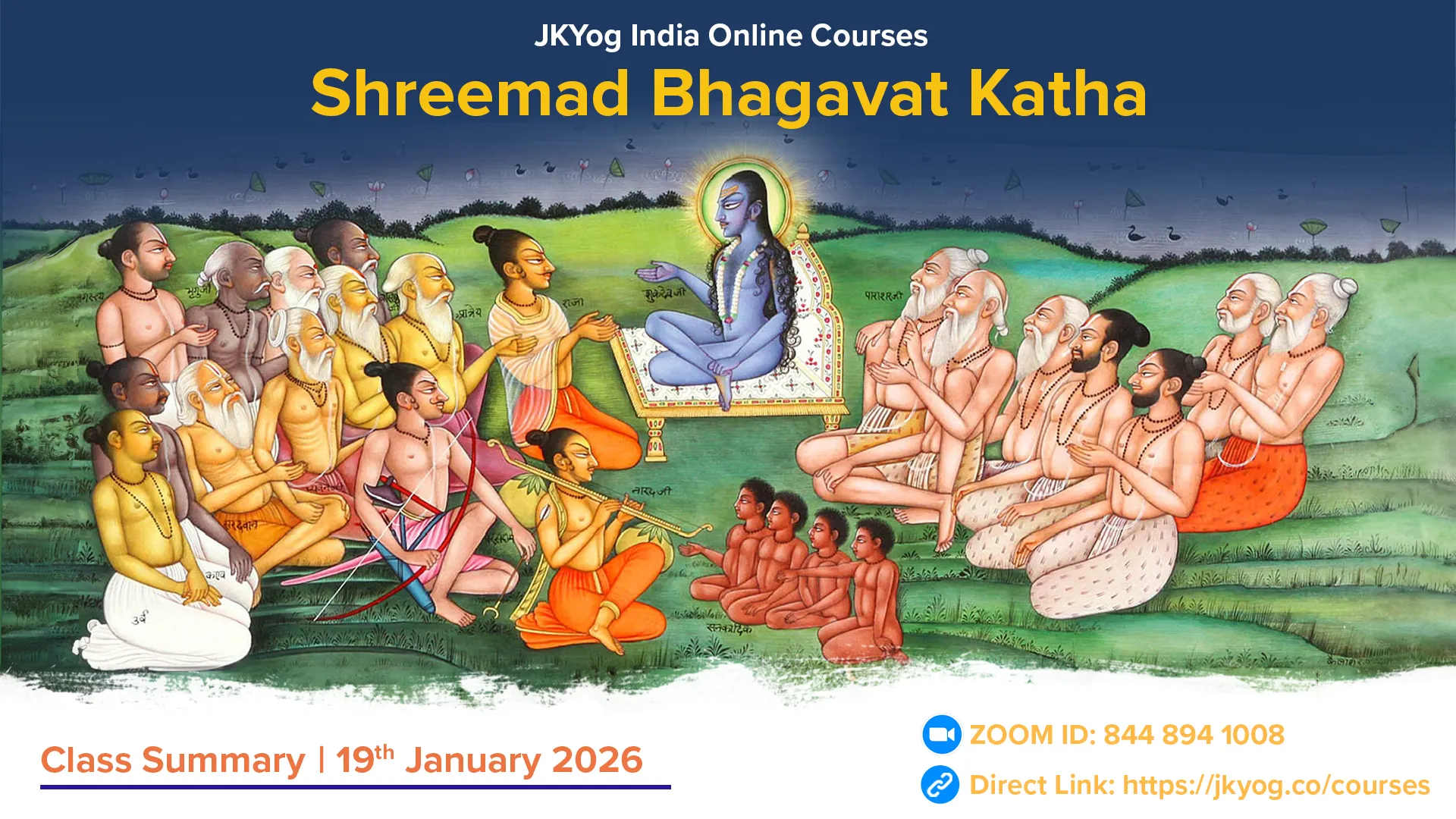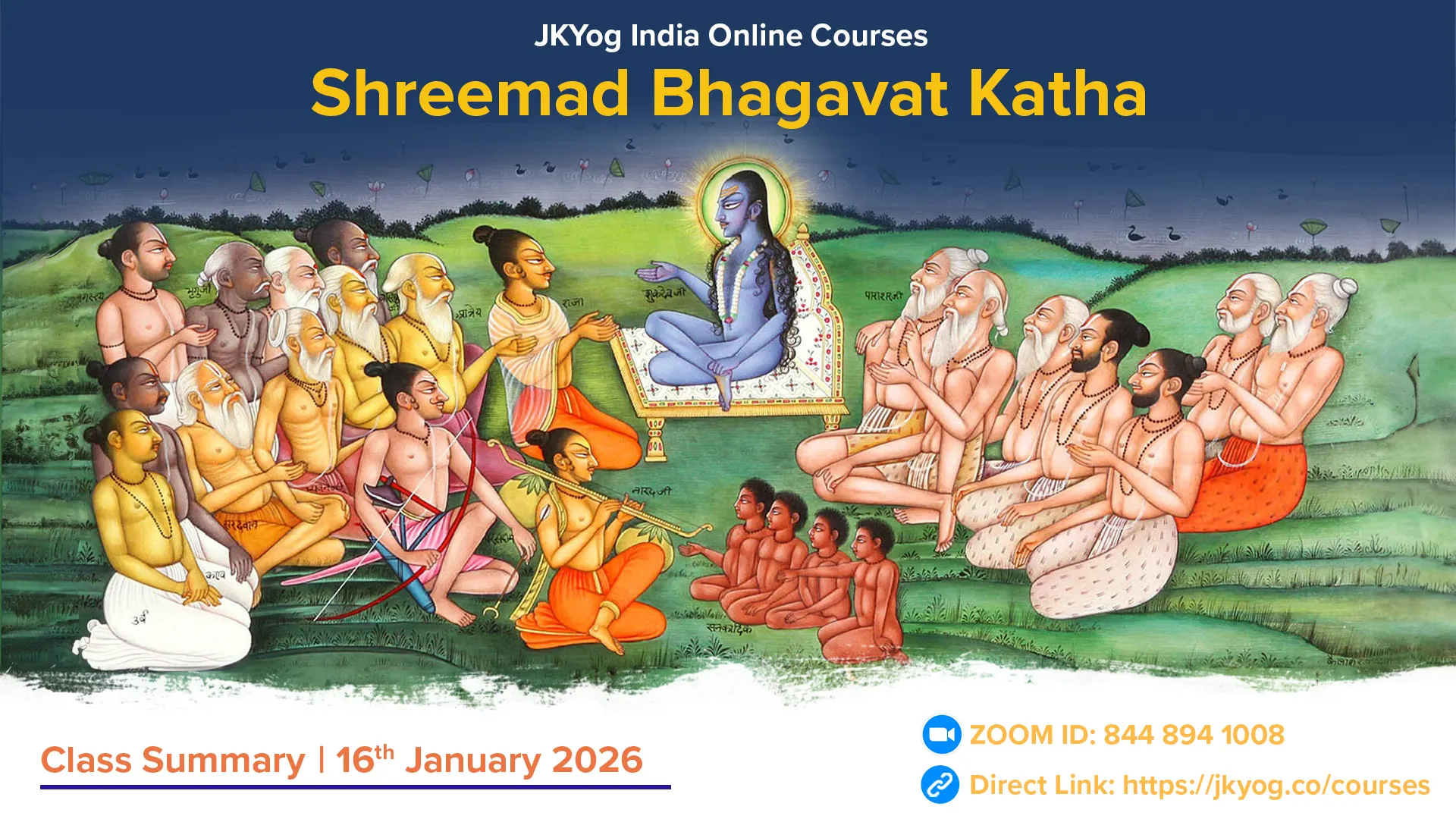Shreemad Bhagavat Mahapuran- Canto: 9, Chapters: 1-3
King Parikshit humbly says to Shree Shukadevji, "Revered one! You have narrated all the Manvantaras and the divine pastimes performed by Bhagwan in each of them. You mentioned how, at the end of the previous Kalpa, King Satyavrat attained divine knowledge through the service of Bhagwan and was then born in this Kalpa as Vaivasvat Manu. You also spoke of his sons, like Ikshvaku and others. Now, I request you to describe the lineage of Vaivasvat Manu, those who have lived, those living now, and those yet to come."
Shree Shukadevji says, "At the time of Pralaya, only the Supreme Divine Being existed, nothing else. From His navel emerged a golden lotus, from which the four-headed Brahmaji manifested. From Brahmaji's mind was born Marichi, from Marichi came Kashyap, and from Kashyap's wife, Aditi, was born Surya (Vivasvan).
From Vivasvan and his wife, Sangya, was born Shraddhadeva Manu (Vaivasvat Manu). King Manu, with his wife Shraddha, had ten sons: Ikshvaku, Nriga, Sharyati, Dishta, Dhrishta, Karusha, Narishyanta, Prishadhra, Nabhag, and Kavi.
The Story of Ila—Daughter of Manu, Transformed from Female to Male by Sage Vashishtha
Initially, Vaivasvat Manu was without offspring. His guru, Sage Vashishtha, advised him to perform a Mitra-varun yajna for the blessing of a child. At the beginning of the yajna, Manu's wife Shraddha privately requested the hotā (the priest who chants mantras during yajnas) that she wished for a daughter. Taking this into account, the hotā chanted the mantras accordingly and offered oblations into the fire.
As a result, instead of a son, a daughter named Ila was born. Manu was displeased. He asked Sage Vashishtha why, despite doing everything properly, they received the opposite result. Sage Vashishtha assured him that by the power of his austerity, he would give them an excellent son.
He then worshipped Bhagwan Narayan. Pleased with his devotion, Narayan granted a boon, and the same daughter, Ila, was transformed into a noble son named Sudyumna.
The Story of Sudyumna Becoming Ila Again: From Man to Woman Once More
Once, King Sudyumna mounted a horse from the Sindhu region and ventured northward into the forest with his ministers for a hunting expedition. Armed with his bow and arrows, he chased deer deep into a forest near Mount Meru, a divine region where Bhagwan Shiva resides with Devi Parvati.
As soon as he entered that forest, something astonishing happened. Sudyumna transformed into a woman. His horse turned into a mare, and all his ministers also became women. Shocked by their sudden transformation, they looked at one another in disbelief. Their hearts filled with sorrow and confusion.
Hearing this, King Parikshit is amazed. He asked, “How did such a mysterious power come to reside in that forest? Who made that forest capable of such transformations? Please explain, for I am eager to know the reason.”
Shree Shukadevji replies: Once, some sages went to that very forest to have the darshan of Bhagwan Shankar. At that time, He was enjoying playful moments with Parvatiji. She was unclothed, and upon seeing the sages unexpectedly arrive, She quickly dressed out of modesty. The sages, seeing Bhagwan Shiva with Devi Parvati, respectfully turned away and left the place, heading towards the hermitage of Nar-Narayan.
To appease Parvatiji, Bhagwan Shiva granted Her a boon: “From now on, any man who enters this forest shall be transformed into a woman.”
That is the reason why Sudyumna and his retinue underwent such a transformation.
Buddh Falls in Love with Ila
From that time onward, no man dared to enter that forest. But since Sudyumna had unknowingly stepped into it, he had turned into a woman. Along with his companions, who had also become women, he wandered from one part of the forest to another.
One day, Chandra's son Buddh happened to see this enchanting woman (who was Sudyumna in female form). He was captivated by her beauty and desired to marry her. The female-form Sudyumna, now known as Ila, accepted Buddh as her husband. From their union, a son named Pururava was born.
Later, Sudyumna remembered his guru, Vasishtha, and called upon him. When Vasishtha came to know about his disciple's strange condition, he performed intense worship of Bhagwan Shiva. Pleased by the penance, Bhagwan Shiva granted a boon, "Sudyumna will live one month as a man and one month as a woman. In this way, he may rule his kingdom."
Sudyumna was thus restored to his male form intermittently and resumed ruling his kingdom. However, because of this alternating identity, the public found it difficult to accept him as their sovereign fully. Sudyumna had three sons, Utkal, Gaya, and Vimal, who became kings in the southern regions of Bharat (India). In his later years, Sudyumna handed over the kingdom to his son Pururava and retired to the forest for penance.
At that time, Vaivasvat Manu, desiring a son, performed penance on the banks of the Yamuna River for a hundred years. As a result of this intense austerity, he received ten sons, all of noble character and strength. The eldest among them was Ikshvaku, who would go on to found the famed Ikshvaku dynasty.
The Lineages of Manu's Sons
Among the sons of Manu, one was Prishadhra. His guru, Vasishtha, appointed him as a night guard to protect the cows. Every night, Prishadhra diligently guarded the cowshed. One night, during a heavy downpour, a tiger entered the cowshed. The frightened cows began to run, and the tiger caught one of them. Hearing the cow's cries, Prishadhra rushed with his sword. But due to the dense darkness, he could not see clearly and, mistaking the cow for the tiger, accidentally beheaded it. Though the tiger's ear was cut, and it fled in fear, the damage was done. At dawn, realising his mistake, Prishadhra was deeply grieved. Even though the act was unintentional, Vasishtha cursed him, "You shall no longer remain a Kshatriya."
Prishadhra humbly accepted the curse and adopted a life of strict naishthik brahmacharya (lifelong celibacy). He became a selfless well-wisher of all beings, an exclusive devotee of Bhagwan Vasudev. He renounced all possessions, lived with complete detachment, contentment, and absorption. He wandered the earth like a mute, deaf, and blind man, unattached and silent. Eventually, he entered a forest engulfed in wildfire, offered his senses into the fire, and attained Bhagavat-prāpti (realisation of God).
Manu's Youngest Son – Kavi
The youngest of Manu's sons, Kavi, was completely detached from worldly desires. He renounced the kingdom and went to the forest with his brothers. Even in his youth, he attained the realisation of the Supreme Being and achieved moksha (liberation).
Karusha Lineage
From Karusha, a clan of Kshatriyas called the Karushas emerged. They were devoted to Brahmins, dharma-loving, and protectors of Northern India.
Dhrishta Lineage
From Dhrishta came the Dharshṭa Kshatriyas, who later, while still in their physical bodies, transformed into Brahmins.
Nriga Lineage
The lineage of Nriga went as follows: Nriga → Sumati → Bhūtajyoti → Vasu → Pratik → Oghavan. Oghavan's son was also named Oghavan, and his daughter Oghavati was married to Sudarshan.
Nariṣyanta Lineage
The lineage from Nariṣyanta: Nariṣyanta → Chitrasena → Riksha → Meedhvān → Koorcha → Indrasena → Vītihotra → Satyashrava → Urushrava → Devadatta.
From Devadatta was born Agniveshya, a partial incarnation of Agni Deva, who later became renowned as Maharshi Jātukarṇya. The Āgniveshyāyana gotra among Brahmins traces back to him.
Dishta Lineage
From Dishta came Nābhāga (distinct from another Nābhāga). Due to karmic influence, Nābhāga became a Vaishya.
The lineage continued: Nābhāga → Bhalandan → Vatsaprīti → Prānshu → Pramati → Khanitra → Chakshusha → Vivinshati → Rambha → Khaninetra → Karandhama → Avīkṣit.
Avīkṣit's son was the Chakravarti Raja Marutta, who performed a grand yagna under the guidance of Rishi Samvarta. All utensils used in the yagna were of gold. Even Indra joyfully drank soma there; Marutgan served, and Vishvedev were present as honoured guests.
Marutta Lineage: Marutta → Dama → Rajyavardhan → Sudhati → Nara → Keval → Bandhuman → Vegavan → Bandhu → Ṛṇabindu (Trinabindu).
Trinabindu was an exemplary king. The apsara Alambusha accepted him as her husband. They had many sons and a daughter named Idavida. From Idavida and Rishi Vishrava, Kubera was born. Vishrava had received divine knowledge from his father, Pulastya.
Vishrava's second wife was Kaikashi, daughter of the rakshasa Sumali. From her were born Ravana, Kumbhakarna, Vibhishan, and Shurpanakha.
Trinabindu's Sons: Vishāla, Shunyabandhu, and Dhoomraketu.
Vishāla founded the city of Vaishali.
Vishāla → Hemachandra → Dhoomraksha → Sanyam → Krishāshva and Devaj → Krishāshva → Somadatta.
Somadatta performed the Ashwamedha Yajna, worshipped the Yajnapati Bhagwan, lived in the company of Yogis, and attained moksha.
Somadatta → Sumati → Janamejaya. All these Vishāla dynasty kings upheld and magnified the glory of their ancestor Trinabindu.
The Wondrous Story of Maharshi Chyavan and Sukanya
Manu’s son, King Sharyati, was a righteous ruler well-versed in the Vedas. He had a beautiful, lotus-eyed daughter named Sukanya. One day, while wandering through the forest with his daughter, the king arrived at the hermitage of Chyavan Muni.
As Sukanya roamed the forest with her friends, she noticed two glowing lights inside a termite mound. Out of childish curiosity and impulsiveness, she poked them with a thorn. But those glowing lights were actually the eyes of Maharshi Chyavan, who was deep in intense meditation. Blood began to flow from his eyes, and instantly, the king’s soldiers began to suffer from involuntary urination and defecation.
King Sharyati suspected that someone must have unknowingly offended the sage. When questioned, Sukanya confessed to her mistake. To atone, King Sharyati approached the great sage with humility, seeking forgiveness. As penance, he offered his daughter in marriage to the aged, blind, and ascetic Chyavan Muni.
Despite the sage’s appearance and condition, Sukanya served her husband with utmost devotion and selfless love, gradually winning over his heart.
Ashwini Kumars Rejuvenate Chyavan Muni
Some time later, the god's physicians, the Ashwini Kumars, visited the hermitage. Chyavan Muni expressed his desire to regain his youth and beauty and promised them a share of Soma (nectar) in a future yajna. The Ashwini Kumars said, "This is a sacred pond created by siddhas. Bathe in it."
At that time, Chyavan Muni was extremely old, with wrinkled skin, bulging veins, white hair, and a frail body. He looked anything but appealing. The Ashwini Kumars gently supported him and helped him enter the pond.
Moments later, three radiant young men emerged from the waters, all identical in form, wearing the same clothes, garlands of lotuses, and beautiful earrings. They shone with such brilliance that anyone would be captivated. Sukanya was stunned. She could not recognise who among them was her husband.
With deep humility, she turned to the Ashwini Kumars and said, "Please tell me which one is my husband? I cannot and will not accept anyone other than my wedded husband."
Seeing her unshakable devotion and chastity, the Ashwini Kumars were delighted. Smiling, they pointed to one of the youths and said, "He is your husband, Chyavan Muni. Pleased by your love and service, he has now been granted this rejuvenated form."
Chyavan Muni then vowed to give the Ashwini Kumars a rightful share in the Soma yajna. With joy, they returned to the heavens.
A few days later, inspired by the desire to perform a yajna, King Sharyati returned to Chyavan Muni's hermitage. But what he saw shocked him; his daughter, Sukanya, was seated beside a dazzlingly radiant young man, glowing like the sun. Sukanya respectfully bowed to her father, but Sharyati was filled with anger and doubt.
He scolded her harshly, "You wretched girl! Have you brought disgrace to our lineage? Have you left the old and revered Muni and taken a wandering stranger as your husband? Have you no shame? You are dragging our family into hell!"
Sukanya smiled gently and replied, "Father, he is not a stranger. He is your son-in-law, the great tapasvi, Bhargava Muni Chyavan himself. This is his rejuvenated form."
She then narrated the entire tale of how the Ashwini Kumars had transformed him. Sharyati was first stunned, then overwhelmed with joy. He embraced his daughter with pride and affection.
After this, Chyavan Muni organised a grand Soma yajna with King Sharyati. Through his spiritual power, Chyavan ensured that the Ashwini Kumars received their rightful share of Soma. Until then, the other gods had denied them this honour, considering them mere physicians.
But this enraged Indra, king of the devas. In anger, he raised his vajra to punish Sharyati. Instantly, Chyavan Muni used his yogic powers to freeze Indra's arm in place, along with the weapon.
At last, all the devas had to yield, and the Ashwini Kumars were granted full rights to partake in Soma during yajnas.
Marriage of Revati to Balramji
King Sharyati had three sons, Uttanbarhi, Anarta, and Bhurisheṇa. Anarta’s son was the mighty Revata. King Revata established a magnificent city named Kushasthali beneath the ocean and ruled from there over the lands of Anarta and the surrounding regions.
Revata had a hundred sons, the eldest of whom was Kakudmi. When Kakudmi could not find a suitable groom for his daughter Revati, he decided to seek divine guidance and took her to Brahmalok, the abode of Brahmaji. At that time, the path to Brahmalok was accessible to all.
Upon reaching there, Kakudmi found that a grand musical performance and festival were in progress. Respectfully, he waited for the performance to end before presenting his request to Brahmaji.
When the performance concluded, Kakudmi bowed and explained his concern. On hearing this, Brahmaji laughed gently and said, “O King, the grooms you had in mind have all passed away long ago. Even their descendants are forgotten, for during your brief visit here, 27 chaturyugas have passed on Earth.”
Brahmaji then added, “At this very moment, Shree Krishna’s chatur-vyuha expansion Sankarshan is present on Earth in the form of Balramji. He has descended to lighten the burden of the Earth. Offer your daughter to Him.”
Hearing Brahmaji’s divine instruction, Kakudmi bowed in reverence and returned to his kingdom. But by then, ages had passed. His descendants had abandoned his city due to fear of the yakshas, who had scattered and resettled elsewhere.
Kakudmi then fulfilled Brahmaji’s command and married his daughter Revati to Shree Balramji. Thereafter, he renounced worldly life and proceeded to Badrivan, to the hermitage of Bhagwan Nar-Narayan, to engage in deep penance.
Summary: JKYog India Online Class- Shreemad Bhagavat Katha [Hindi]- 01.08.2025

